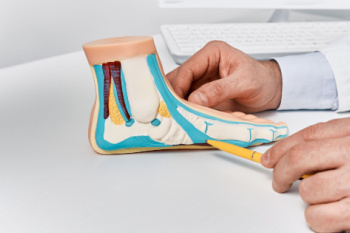
Flat feet, or pes planus, occur when the arches of the feet do not develop properly or collapse over time, resulting in the entire sole touching the ground when standing. This condition is common and often begins in childhood, with flexible flat feet being the most prevalent type. In this form, the arch appears only when the foot is lifted and disappears when it touches the ground. While many individuals experience no pain, flat feet can often cause discomfort during prolonged standing, walking, or running. Additional causes can include a tight Achilles tendons and posterior tibial tendon dysfunction, which may lead to pain and instability in the foot and ankle. Factors like genetics, aging, injury, obesity, and certain medical conditions increase the risk of developing flat feet. A podiatrist can evaluate your foot structure, recommend orthotic supports, and suggest treatments to alleviate pain. If you often experience foot problems related to flat feet, it is suggested that you schedule an appointment with a podiatrist for an exam and treatment options.
Flatfoot is a condition many people suffer from. If you have flat feet, contact Lesly Honore, MD, DPM from New York. Our doctor will treat your foot and ankle needs.
What Are Flat Feet?
Flatfoot is a condition in which the arch of the foot is depressed and the sole of the foot is almost completely in contact with the ground. About 20-30% of the population generally has flat feet because their arches never formed during growth.
Conditions & Problems:
Having flat feet makes it difficult to run or walk because of the stress placed on the ankles.
Alignment – The general alignment of your legs can be disrupted, because the ankles move inward which can cause major discomfort.
Knees – If you have complications with your knees, flat feet can be a contributor to arthritis in that area.
Symptoms
- Pain around the heel or arch area
- Trouble standing on the tip toe
- Swelling around the inside of the ankle
- Flat look to one or both feet
- Having your shoes feel uneven when worn
Treatment
If you are experiencing pain and stress on the foot you may weaken the posterior tibial tendon, which runs around the inside of the ankle.
If you have any questions, please feel free to contact our office located in Hempstead, NY . We offer the newest diagnostic and treatment technologies for all your foot care needs.
